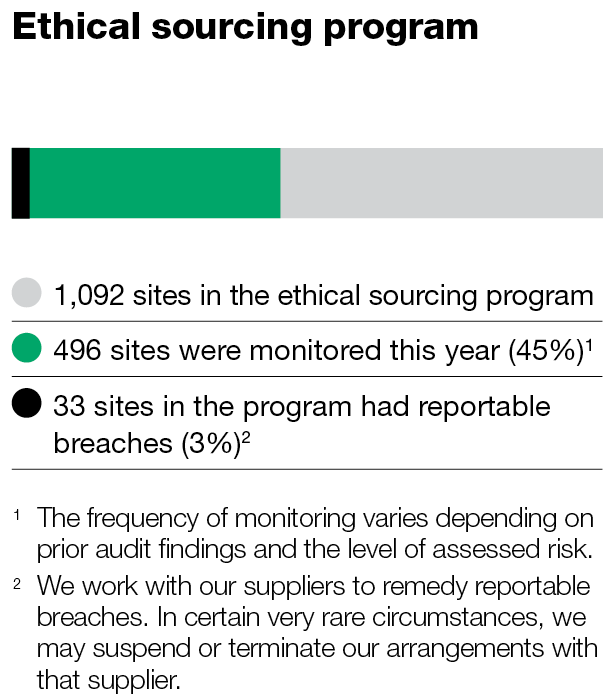
Officeworks - Ethical sourcing
Officeworks sells thousands of products that come from around the world and have been created by many different people. Supply chains are complex, with products or components often manufactured in countries where laws designed to protect workers’ rights are not sufficient or adequately enforced.
Officeworks’ approach is guided by the United Nations Guiding Principles on Business and Human Rights (UNGPs), which highlight that all businesses have a responsibility to uphold and respect human rights. Officeworks believes all workers throughout our supply chain have a right to operate in a safe environment of their choosing, and that taking care of employees is better for people and the businesses they work for.
During the year, Officeworks continued to complement its risk-based, audit-centric approach with an outcome-focused program aimed at improving worker wellbeing and engagement within its direct supply chain. This is in recognition that ethical sourcing audits alone may not provide the full picture of working conditions and employee concerns.
Officeworks’ worker survey program allows it to continuously engage with workers to identify concerns that might not have been captured during audits, and to work with factory management to take appropriate action to embed positive change for workers. The surveys capture worker sentiment across five areas, including grievance mechanisms, wages, working hours, workplace wellbeing, environment, health and safety, and productivity and stability. Following a successful pilot program in the 2021 financial year, Officeworks has continued to roll-out its worker survey program across four new factories in the 2022 financial year.
During the first round of worker surveys, a total of 1,258 workers across four factories shared their concerns, which included a lack of trust in internal grievance channels, lack of understanding of how wages are calculated, unequal treatment of workers based on their gender, and dissatisfaction with working hours. Using this information, Officeworks collaborated with factory management to implement actions to address worker concerns and improve overall working conditions. This involved additional worker training and investing in resources, including new machinery and staff, to reduce working hours and a cost-of-living comparison conducted by factory management to ensure the wages offered to employees are sufficient to cover basic living needs. In some instances, it involved creating more enjoyable workplaces by providing more opportunities for social interaction, addressing direct suggestions from employees. Multiple factories found the worker surveys useful and decided to take a step further by implementing their own pulse surveys to enable continuous, direct communication with their workers.
Six months after the first round of surveys, Officeworks conducted follow-up surveys to understand worker sentiment at three of these sites. Officeworks was able to increase the overall response rate across these sites from about 30 per cent to just over 50 per cent. It was pleasing to see the implemented initiatives were effective and that worker sentiment improved across all survey areas, with the biggest improvements relating to wages and working hours. After comparing the changes in survey scores, a 17 per cent improvement in worker satisfaction was achieved, evidencing positive change for the 2,269 workers at those factories.
After two years of working collaboratively with its suppliers, Officeworks has gathered valuable program insights into the outcomes of this work, enabling Officeworks to become more sophisticated in its approach to identifying and remediating risks within the supply chain.
In the 2023 financial year, Officeworks will continue to expand its Worker Voice program and support its partners to realise the benefits of taking meaningful action on direct worker feedback as it works towards its goal of enabling positive change for 15,000 workers in its supply chain by 2025.
Globally, it is estimated there are currently 40 million people trapped in modern slavery. The Australian Department of Home Affairs defines modern slavery as situations where coercion, threats or deception are used to exploit people and undermine their freedom. Examples of common modern slavery practices today include servitude, forced labour, forced marriage, the worst forms of child labour, debt bondage, deceptive recruiting for labour or services and human trafficking. In today’s highly globalised world where supply chains are long and complex, modern slavery presents a serious issue that all businesses need to work together to unite against and eradicate.
Since 2016, in conjunction with Wesfarmers, Officeworks has released an annual Modern Slavery Statement. The Statement summarises the steps taken by Officeworks, and Wesfarmers more broadly, to identify and mitigate the risk of modern slavery in its operations and supply chains. Officeworks seeks to work with its suppliers and non-government organisations to remediate and scale impact and promote a coordinated approach to tackling complex modern slavery issues.
All suppliers of goods and services must adhere to Officeworks' Ethical Sourcing & Modern Slavery Policy, which outlines the minimum standards required to work with Officeworks. To date, Officeworks has mapped over 28,000 products to the primary site of manufacturing, with 1,092 sites involved in its ethical sourcing audit program.
Officeworks recognises Australia is not immune to issues relating to worker exploitation and takes steps to identify and mitigate modern slavery risks in the services it procures within Australia. This includes through the use of a self-assessment questionnaire to assess modern slavery risk and corresponding corrective actions, which selected service providers are required to complete. From this, Officeworks may require audits to take place for some of these providers. Known at-risk occupations extend beyond factory workers and include cleaners. In addition, Officeworks’ continues to work with the Cleaning Accountability Framework to develop a framework suitable for the retail industry to help improve the working conditions within the Australian cleaning condition.
Officeworks seeks to work with its suppliers and non-government organisations to remediate and scale impact and promote a coordinated approach to tackling complex modern slavery issues.
